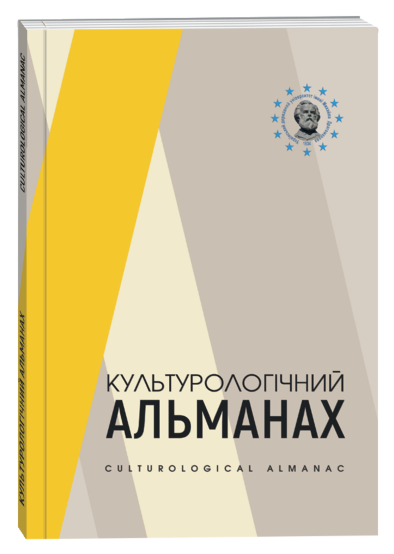DEVELOPMENT OF THE DEPARTMENT OF SOCIAL SCIENCES OF THE KHARKIV THEATER INSTITUTE IN THE FIRST POSTWAR DECADE (1945–1955)
DOI:
https://doi.org/10.31392/cult.alm.2022.3.13Keywords:
social sciences, totalitarianism, personality cult, cold war, cosmopolitism, Kharkiv Institute of TheaterAbstract
The purpose of the work. This scientific paper delves into the studies of the evolution of the Department for Social Sciences of the Kharkov Theater Institute during the first postwar decade of the apotheosis of the totalitarian regime and Stalin personality cult. Teaching, methodical and scientific activities of the academics working for the department and the main of their research papers were analyzed. Methods. When writing the article, the following special
historical methods were used: historical-genetic, which made it possible to trace the development of the department in
the postwar years, changes in the staff, in the course programs and their registers. We used a historical and biographical
approach, which allowed us to analyze the staff of the department, its professional and educational level, etc. The
method of structural analysis war also used, which made it possible to reconstruct the structure of the department
in the years under study. Results. The scientific novelty of the study lies in the fact that for the first, on the basis
of archival and other sources, the educational and methodological, scientific activities, the staff of the Department
of Social Sciences in 1945–1955 were analyzed. Which made the development of social sciences at the time
of beginning of the cold war that had an impact on the development of social sciences in the USSR and other
countries has been investigated. This scientific paper is devoted to the role of Stalinism in organizing the attack
the ideological dissension, and search for “internal enemies” to fight the cosmopolitism. Ideological campaigns
in 40ies–50ies of the century had a negative influence on the development of sciences affecting thus the activities
of Kharkov historians and scientists. Conclusions. In conditions of confrontation between the USSR and USA
the departments of social sciences were assigned a special role in the disclosure of “bourgeois ideology”, fighting
the “anti-patriotism” and “cosmopolitanism”. At the end of 40ies and the beginning of 50ies the country launched
the campaign for the search of “internal enemies”. During the analyzed decade the social science was developed
at the Institutions of Higher Education as a single stream of the entire soviet science. The decisions taken by the Party
and the government on ideological issues had an essential influence on the development of social sciences and were
aimed at the improvement of the teaching process in the spirit dictated and required by the government.
The period in question is characterized by a gradual improvement of teaching-methodical and research activities.
More rigid requirements were set to the quality of thesis, scientific topicality and research topics. The scope of studied
topics was extended and it can be seen on the example of the activities carried out by the Department for Social
Sciences at the Kharkov Institute of Theater.
References
Барсенков А.С. (2003). История России. 1938–2002 : учебное пособие / А.С. Барсенков, А.И. Вдовин. Москва : Аспект-Пресс. 540 с.
Добрускин М.Е. (1952). Новая интеллигенция в странах народной демократии. Вопросы философии. № 1. С. 85–102.
Добрускин М.Е. (1951). В интересах идейного воспитания студенчества. Советское искусство. 24 октября. С. 2.
Звіт про роботу Харківського театрального інституту за 1951/1952 навч. рік. Державний архів Харківської області (ДАХО). Ф. 6066. Оп. 1. Спр. 32. 93 арк.
Звіт про роботу Харківського театрального інституту за 1953/1954 навч. рік. Державний архів Харківської області (ДАХО). Ф. 6066. Оп. 1. Спр. 49. 80 арк.
Звіт про роботу Харківського театрального інституту за 1954/1955 навч. рік. Державний архів Харківської області (ДАХО). Ф. 6066. Оп. 1. Спр. 56. 52 арк.
Золотий час: Нариси до 95-річчя утворення ХНУМ імені І.П. Котляревського / ред. упоряд. І.І. Ганзбург. Харків : Вид-во ТОВ «С.А.М.», 2012, 400 с.
ХVI з’їзд Комуністичної партії (більшовиків) України. 25–28 січня 1949 р. Матеріали з’їзду. Київ : Укрполітвидав, 1949. 255 с.
Іваненко В.В. (2007). Історія радянської держави (1917–1991) : навчальний посібник / В.В. Іваненко, А.І. Голуб, А.Ю. Шевченко. Дніпропетровськ : Вид-во ДНУ, 2007. 575 с.
Історик і влада : монографія / І. Колісник, В. Смолій. Київ : Ін-т історії України НАН України, 2016. 543 с.
Матеріали про роботу кафедр Харківського театрального інституту за 1949/1950 навч. рік. Державний архів Харківської області (ДАХО). Ф. 6066. Оп. 1. Спр. 20. 64 арк.
Костырченко Г.В. (1994). В плену у Красного фараона. Политические преследования евреев в СССР в последнее сталинское десятилетие. Документальное исследование. Москва : Международные отношения. 400 с.
Новітня історія України, 1900–2000 : навчальний посібник / А.Г. Слюсаренко, В.І. Гусев, В.М. Литвин та ін. Київ : Вища школа, 2002, 719 с.
Поляков Ю.А. (1999). Историческая наука: люди и проблемы. Москва : РОССПЭН, 1999. 455 с.
Попов В.М. (1968). Учені вузів Української РСР. Київ : Вид-во Київського університету, 1968. 516 с.
Харьковский институт искусств имени И.П. Котляревского 1917–1922. Харьков : Изд-во Харьковского института искусств им. И. П. Котляревского, 1992. 445 с.
Харківський державний університет імені І. П. Котляревського Pro Domo Mea: Нариси. До 90-річчя з дня заснування Харківського державного університету мистецтв імені І.П. Котляревського / ред. Т.Б. Вєркіна, Г.А. Абаджян, Г.Я. Батунова та ін. Харків : Харк. держ. ун-т мистецтв ім. І.П. Котляревського, 2007. 336 с.








